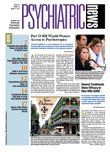As this column is being written, Washington, D.C., is in the midst of a hot and humid summer. Colleagues are preparing for or returning from vacation, and there is the expectation that the pace should be kinder, gentler, or at least slower.
Not so at APA. Even the traditional August break is not observed here. Our organizational schedule is full, ranging from continued work with Congress before its recess, completing work on the Institute on Psychiatric Services being held October 11 to 14 in New Orleans, to plans for the 2008 annual meeting in Washington, D.C., May 3 to 8, and arrangements for the traditional meeting of APA's committees and councils immediately after Labor Day.
Current work involves preparing a draft budget with options for the Budget and Finance Committee, whose members include officers of the Board and Assembly and psychiatrists with expertise in financial issues. At its next meeting, this committee, chaired by Jack Bonner, M.D., will review the overall financial status of the Association and reports from the APA Financial Oversight Committee, which assesses APA's financial status monthly through paper review and conference calls, and then consider budget options for 2008.
The process is intensive, as each member program and staff office is evaluated in detail through an examination of its goals and objectives as well as an analysis of its financial needs and expenditures. The short-term strategy is relatively simple: Expenditures cannot exceed available income, and the budget is planned as a break-even budget, including a contribution to replenish the reserves. There needs to be a balance: if the budget is not planned or executed well, shortfalls could leave the Association in the red, or conversely, if planning is too conservative, money that could be used for Association priorities could be tied up through budgetary allocations but not spent, possibly leaving some important programs unfunded.
Oversight with mid-course correction is a crucial aspect of budget execution. Over the past five years, we have been very successful in this process, finishing each year with a surplus that has allowed us to replenish the reserves with an amount greater than had been budgeted earlier in the year. Our goal is eventually to have 100 percent of the annual operating budget in our long-term reserves.
APA has three major sources of revenue: publications, dues, and the annual meeting. Publications bring in almost half of our revenue—about $29 million—but are associated with costs of some $19 million, for a net income of $10 million.
Similarly, the annual meeting generates almost a quarter of our revenue—about $15 million, with associated expenses around $6 million. Approximately half of our meeting income is from registration fees. New York and San Francisco traditionally draw the highest numbers of attendees, but also are costly cities and thus generate greater meeting expenses.
Membership continues to increase, and dues account for $10 million annually. It is noteworthy that national dues have not been increased for more than a decade. These funds support Association initiatives such as member relations, governance, and, most importantly, advocacy.
From the perspective of funds available for Association initiatives, advocacy receives the largest slice of the pie—39 percent, with education, research, and minority/national affairs receiving 14 percent, 10 percent, and 5 percent of available fund, respectively, and governance accounting for 34 percent. In looking for ways to limit governance costs, we recognize that this category includes important member participation in the overall work of the Association. Parenthetically, I tried to contribute to cost containment by holding the recent Board of Trustees planning meeting at a much less expensive hotel than ones used in past years.
A successful audit of Association finances was completed this spring and reported to the Board. The auditors reported that APA was in strong financial shape, that there were no material difficulties, and that APA has a good system of financial control. The auditors complimented staff and overall function, noting that we were in the top 5 percent of organizations with which they worked.
Congratulations are in order to Donna Norris, M.D., our secretary-treasurer, and to Drs. Jay Scully and Chief Financial Officer Terri Swetnam for their outstanding work on our behalf. They demonstrate the best of member and staff partnership to strengthen our Association and help psychiatrists help patients. Working together with one voice, we can achieve our goal of advancing science, care, and the profession.
As part of our commitment to fiscal transparency, more specific financial information can be found in the Members Corner section of APA's Web site at<www.psych.org>.▪

